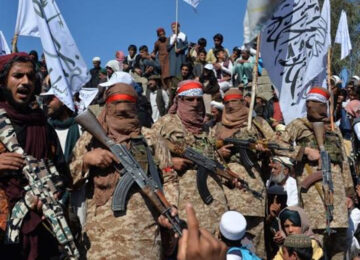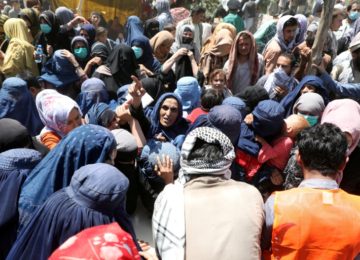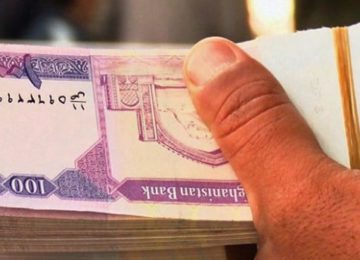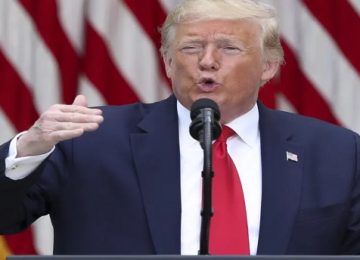October 19, 2017
-By Ambassador Mian Sanaullah
The Quadrilateral Coordination Group (QCG) on Afghanistan re-entered the spotlight with its stalled sixth session taking place in Muscat on September 16 this year. In a way, representatives of all its members with the required positive briefs indicated the sense of seriousness that the challenges involved demanded. Pakistan sent its top diplomat, Foreign Secretary Tehmina Janjua, US sending its Assistant Secretary of State, Alice Wells whereas Afghanistan sending its Deputy Foreign Minister Hekmat Khalil Karzai.
Prior to the meeting, Afghan Chief Executive Abdullah Abdullah hoped that the meeting would help improve his country’s relationship with Islamabad. Amin Waqad, a close aide to Afghan President Ashraf Ghani and a senior member of the High Peace Council (HPC), said, “HPC and government representatives will participate, and it is an important one because the Taliban representatives will be there. We will go with a clear plan.” On the part of Afghan Foreign Ministry (Shekib Mustaghni, its spokesman) there was a note of concern; “We expect that specific goals should be set for the fulfilment of the promises made in the past meetings and also for the peace roadmap that was sketched”.
Pakistan’s Foreign Minister also seemed optimistic, “The quadrilateral arrangement will again be in operation. So, that is something we still hope will… still work,” he told the Voice of America recently. By agreeing to participate in a process that aims to resume talks with Taliban, the Trump administration has also showed softening of its stance that it is not entirely focused on the military option. In Washington, the talks were viewed as significant not because they could lead to an immediate truce with the Taliban, but because they provide an opportunity to Islamabad and Washington to iron out their differences over a political solution to the Afghan conflict. On the other hand, China – an important stakeholder in the process – has always supported the QCG initiative and acknowledged its importance in the Afghan peace process.
Since no official statement was issued after the meeting, it is not clear whether Taliban were invited to the meet or ignored? According to Reuters, Afghan Taliban representatives did not join the talks. Taliban sources said they had not received an invitation and planned to skip the discussions in Muscat. Reports have also appeared in media that had they received the invitation, they would still have boycotted the meet. Such negative remarks continue to cast doubts on efficacy of QCG and, in fact, its future too. No doubt, the general expectation was that the resumption of the process would help prepare the necessary ground for the fifth informal member namely Taliban to join the talks for peace in Afghanistan. Their absence literally took the wind out of the resumed QCG and reduced it to another gathering on Afghanistan.
The US has always argued that Pakistan has sheltered agents of chaos including Afghan Taliban, it could therefore exert more influence on the group to start negotiating with the Kabul government. The Afghan government too thinks that if Pakistan stops supporting Taliban, they cannot sustain themselves beyond two months. Pakistani officials deny sheltering Taliban militants and say their influence on the group has waned. Interestingly, Pakistani Foreign Minister Khawaja Asif said last week that Moscow’s influence on the Taliban might have increased to the point that Moscow would be better placed than Islamabad to coax the insurgents into peace talks. Analysts have not pinned high hopes on the QCG peace process. Taliban were opposed to join the process even under pressure from Pakistan or persuasions and guarantees from China. They distrusted the government in Kabul and also USA.
Since the first quadrilateral meeting held between Afghanistan, Pakistan, China and US on the side-lines of Heart of Asia Summit in 2015, Taliban’s stance on talks with the Kabul government remains unchanged. “We have nothing to do with this meeting. It is their own affair”. Their precondition that no engagement in any Afghan peace talks until the US and NATO forces completely withdraw from the war-torn country stays intact. The QCG process is being revived at a time when the US military has stepped up counter-Taliban operations in Afghanistan in a bid to halt resurgent Taliban advances and pressure them to engage in peace talks.
The tough New US Afghan policy unfortunately has not changed the Taliban’s mind-set yet. Rather, they are emboldened that the increased US aerial bombardment this year had not dented their rising support in rural Afghanistan. On top of that, they are getting political support from erstwhile foes like former President Hamid Karzai. “Military action, especially by foreign forces, will not bring peace. Afghans need to evolve a consensus to reach out to everybody, including ‘sons of the soil’ Taliban, to seek a settlement,” he suggested. All QCG members want peace in Afghanistan. They also agree that a military solution has its limits. Also, they think, only diplomacy will eventually deliver a lasting solution. So the end result is clear to all but vague are the terms of engagement generating new mistrusts and challenges.
The issue is what is on the table for Taliban? All stakeholders have to cooperate with partners in the region. Peace has to be the one Afghans dream, aspire and not the one which each stakeholder wants as per its vision and strategic agenda. Given the political culture and traditions in Afghanistan, nothing is permanent in politics. So future political discussions with the Taliban under QCG or other mechanisms are not impossible, but for that to happen, the Afghan government and regional supporters need to collaborate and incentivize the Taliban to engage in negotiating solutions; offering respectable share to Taliban into the political sphere of the country.
Analysts such as former US special representative for Afghanistan and Pakistan, Richard Olson, at a recent public talk in Washington, also emphasized on the need for making a political settlement with the Taliban a central element of the US policy. The former US envoy also noted that regional countries would have to be involved in Afghan peace building efforts because of an increase in the “hedging strategies” by countries around Afghanistan. The Muscat QCG proved to be another walk in the Afghan quagmire.
The writer Mian Sanaullah is a former Ambassador. He can be reached at mian.sana@gmail.com.
© 2017 Afghan Studies Center. All rights reserved.








